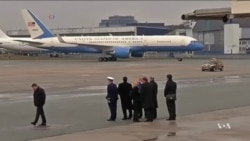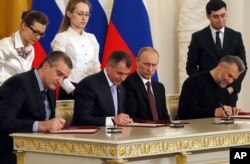LONDON —
U.S. Vice President Joe Biden held talks in Poland on Tuesday aimed at reassuring eastern European allies that they have the support of the United States. His visit took place as Moscow signed a treaty to make the Ukrainian region of Crimea part of the Russian Federation. The tensions and military build-up are unnerving the region.
Standing alongside Polish Prime Minister Donald Tusk, Biden condemned Moscow’s move to make Crimea part of Russia.
“Russia has offered a variety of arguments to justify what is nothing more than a land grab,” he said
Biden landed in Warsaw Tuesday for a visit designed to reaffirm the United States’ protection for its allies in eastern Europe - while also discussing ways to reduce their dependence on Russian energy.
He also is to meet leaders from Estonia, Latvia and Lithuania - which used to be part of the Soviet Union.
These nations look primarily to the United States - not Europe - as their security guarantor, says Nicholas Redman, senior fellow at the International Institute for Strategic Studies.
“It’s actually the power that really lies behind NATO, the United States, that’s the one that they are looking to principally and that they need the reassurance from,” he said.
Close to the Arctic Circle, NATO troops are currently training in northern Norway - part of Exercise Cold Response 2014, planned before the Ukraine crisis erupted. The Russian border is just 450 kilometers away. Norwegian General Major Morten Haga Lunde directs the exercise.
“This is one of the biggest live exercises in Europe this year. 16,000 troops, 15 nations,” said Lunde.
Next to the Ukrainian border, Russian troops have been conducting their own exercises. Events in Crimea have unnerved the entire region, Redman says.
“Even a lot of Russia’s closest allies will be very uneasy about this," said Rodman. "The former Soviet Union, the borders around those countries are historically without precedent. There are a lot of nations that are trapped on the wrong side of lines. There are a lot of contested borders there.”
In response to Russia’s actions, the European Union Monday enacted sanctions against 21 Russian citizens - alongside a United States’ list targeting 11 individuals. British Foreign Secretary William Hague says the measures are indicative of European unity on the issue.
“These are individuals not just in Crimea but in Russia as well, including in the armed forces and in the parliament, people that are associated with the decisions that Russia has made about Crimea,” he said.
Russia’s Foreign Ministry says the sanctions will "lead nowhere." But Europe does have the power to hurt Russia, says analyst Nicholas Redman.
“At the moment, I think there’s a tension clearly between signaling intent and signaling seriousness, but also leaving enough in reserve on the understanding that things could get worse,” said Rodman.
Regional analysts say that possibility is reigniting tensions between Moscow and the West that have lain dormant for two decades; tensions many had hoped were part of history.
Standing alongside Polish Prime Minister Donald Tusk, Biden condemned Moscow’s move to make Crimea part of Russia.
“Russia has offered a variety of arguments to justify what is nothing more than a land grab,” he said
Biden landed in Warsaw Tuesday for a visit designed to reaffirm the United States’ protection for its allies in eastern Europe - while also discussing ways to reduce their dependence on Russian energy.
He also is to meet leaders from Estonia, Latvia and Lithuania - which used to be part of the Soviet Union.
These nations look primarily to the United States - not Europe - as their security guarantor, says Nicholas Redman, senior fellow at the International Institute for Strategic Studies.
“It’s actually the power that really lies behind NATO, the United States, that’s the one that they are looking to principally and that they need the reassurance from,” he said.
Close to the Arctic Circle, NATO troops are currently training in northern Norway - part of Exercise Cold Response 2014, planned before the Ukraine crisis erupted. The Russian border is just 450 kilometers away. Norwegian General Major Morten Haga Lunde directs the exercise.
“This is one of the biggest live exercises in Europe this year. 16,000 troops, 15 nations,” said Lunde.
Next to the Ukrainian border, Russian troops have been conducting their own exercises. Events in Crimea have unnerved the entire region, Redman says.
“Even a lot of Russia’s closest allies will be very uneasy about this," said Rodman. "The former Soviet Union, the borders around those countries are historically without precedent. There are a lot of nations that are trapped on the wrong side of lines. There are a lot of contested borders there.”
In response to Russia’s actions, the European Union Monday enacted sanctions against 21 Russian citizens - alongside a United States’ list targeting 11 individuals. British Foreign Secretary William Hague says the measures are indicative of European unity on the issue.
“These are individuals not just in Crimea but in Russia as well, including in the armed forces and in the parliament, people that are associated with the decisions that Russia has made about Crimea,” he said.
Russia’s Foreign Ministry says the sanctions will "lead nowhere." But Europe does have the power to hurt Russia, says analyst Nicholas Redman.
“At the moment, I think there’s a tension clearly between signaling intent and signaling seriousness, but also leaving enough in reserve on the understanding that things could get worse,” said Rodman.
Regional analysts say that possibility is reigniting tensions between Moscow and the West that have lain dormant for two decades; tensions many had hoped were part of history.














